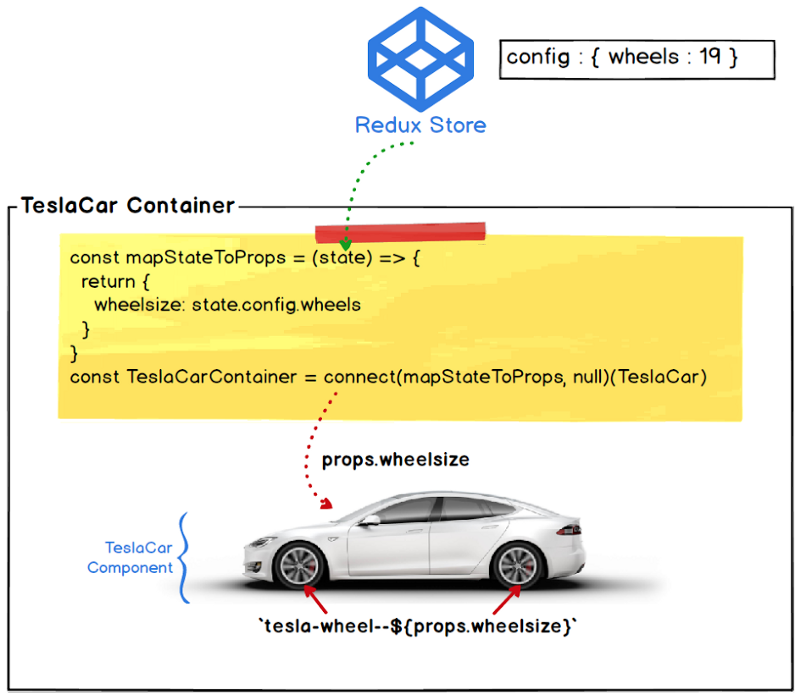2.11 The views: smart and dumb components
As mentioned in 5. Divide The App Into in Containers and Components, we will create Presentational components (dumb components) for presentation purposes and a Container components (smart components) which are wrapper component responsible for Actions while communicating with Redux.
Smart components are responsible for the actions. If a dumb component underneath them needs to trigger an action, the smart component will pass a function through props, and the dumb component can then treat that as a callback.
We already have dumb components for presentation purposes in part 1, and will reuse them.
Here we create container components as upper wrapper around each dumb components.
2.11.1 The view layer binding
Redux needs some help to connect the store to the view. It needs something to bind the two together. This is called the view layer binding. In an app that uses react, this is react-redux.
Technically, a container component is just a React component that uses store.subscribe() to read a part of the Redux state tree and supply props to a presentational component it renders.
Hence, we can manually create container components, but this is not recommended for Redux official docs. This is because react-redux performs many performance optimizations that are difficult to perform manually.
For this reason, instead of writing the container component by hand, we write it using the connect() function provided by react-redux.
Let’s install the necessary packages first.
-
npm install --save redux
-
npm install --save react-redux
2.11.2 TeslarCar Container
To use connect(), you need to define a special function called mapStateToProps. This function tells you how to convert the current Redux store state to props to be passed to the presentation component.
The TeslarCar container takes the wheelsize stored in the current store and passes it to props so that it can be rendered by the TeslarCar component. This props will be updated every time the state is updated.
After defining the mapStateToProps function, we defined the connect()function as shown below.
const TeslaCarContainer = connect(mapStateToProps, null)(TeslaCar)
connect() accepts mapDispatchToProps as the second argument, which takes the dispatch method of the store as its first argument. In the TeslaCar component, we do not need an action, so we have to pass null.
Another parenthesis in connect()() may look weird. This form actually means two function calls, the first connect() returns another function, and the second function needs you to pass a React component. In this case it’s our TeslaCar component. This pattern is called currying or partial application and is a form of functional programming.
Create src/containers/TeslaCarContainer.js and write the code.
2.11.3 TeslaStats Container
As with the TeslaCar container, define only the mapStatToProps function and pass it to connect() in TeslaStats container.
Create src/containers/TeslaStatsContainer.js and write the code.
2.11.4 TeslaSpeedCounter Container
The TeslaSpeedCounter container defines an additional mapDispatchToProps function to handle the user actions that occur in the TeslarSpeedCounter component.
Create src/containers/TeslaSpeedCounterContainer.js and write the code.
2.11.5 TeslaTempCounter Container
The TeslaTempCounter container is almost identical to the TeslaSpeedCounter except for the state and action creators being passed.
Create src/containers/TeslaTempCounterContainer.js and write the code.
2.11.6 TeslaClimateContainer
Create src/containers/TeslaClimateContainer.js and write the code.
2.11.7 TeslaWheelsContainer
Create src/containers/TeslaWheelsContainer.js and write the code.
We have created the container components corresponding to the presentation components generated in part 1 through connect() of react-redux.
import { getModelData } from '../services/BatteryService';
const initialState = {
carstats: [
{ miles: 246, model: "60" },
{ miles: 250, model: "60D" },
{ miles: 297, model: "75" },
{ miles: 306, model: "75D" },
{ miles: 336, model: "90D" },
{ miles: 376, model: "P100D" }
],
config: {
speed: 55,
temperature: 20,
climate: true,
wheels: 19
}
}
function updateStats(state, newState) {
return {
...state,
config: newState.config,
carstats: calculateStats(newState)
}
}
function calculateStats(state) {
const models = ['60', '60D', '75', '75D', '90D', 'P100D'];
const dataModels = getModelData();
return models.map(model => {
const { speed, temperature, climate, wheels } = state.config;
const miles = dataModels[model][wheels][climate ? 'on' : 'off'].speed[speed][temperature];
return {
model,
miles
};
});
}
function appReducer(state = initialState, action) {
switch (action.type) {
case 'CHANGE_CLIMATE': {
const newState = {
...state,
config: {
climate: !state.config.climate,
speed: state.config.speed,
temperature: state.config.temperature,
wheels: state.config.wheels
}
};
return updateStats(state, newState);
}
case 'SPEED_UP': {
const newState = {
...state,
config: {
climate:state.config.climate,
speed:action.value + action.step,
temperature:state.config.temperature,
wheels:state.config.wheels
}
};
return updateStats(state, newState);
}
case 'SPEED_DOWN': {
const newState = {
...state,
config: {
climate:state.config.climate,
speed:action.value - action.step,
temperature:state.config.temperature,
wheels:state.config.wheels
}
};
return updateStats(state, newState);
}
case 'TEMPERATURE_UP': {
const newState = {
...state,
config: {
climate:state.config.climate,
speed:state.config.speed,
temperature:action.value + action.step,
wheels:state.config.wheels
}
};
return updateStats(state, newState);
}
case 'TEMPERATURE_DOWN': {
const newState = {
...state,
config: {
climate:state.config.climate,
speed:state.config.speed,
temperature:action.value - action.step,
wheels:state.config.wheels
}
};
return updateStats(state, newState);
}
case 'CHANGE_WHEEL': {
const newState = {
...state,
config: {
climate:state.config.climate,
speed:state.config.speed,
temperature:state.config.temperature,
wheels:action.value
}
};
return updateStats(state, newState);
}
default:
return state
}
}
export default appReducer;